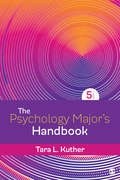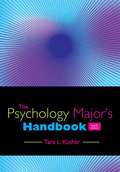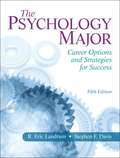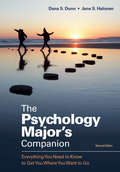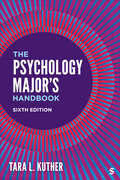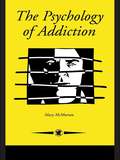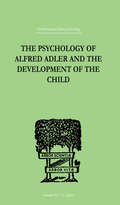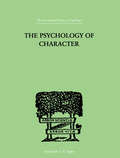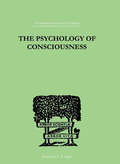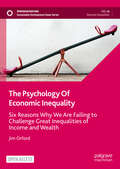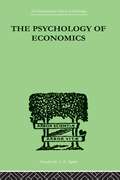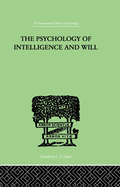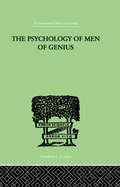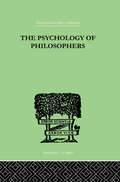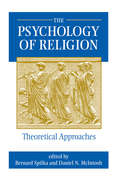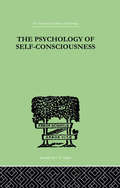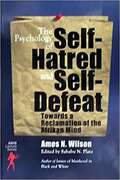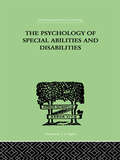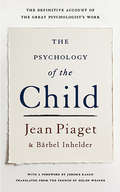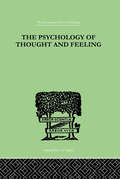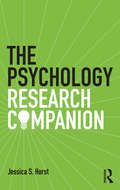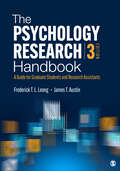- Table View
- List View
The Psychology Major's Handbook
by Dr. Tara L. KutherThe Psychology Major’s Handbook offers students a wealth of practical information to succeed throughout their college journey—from choosing a major and learning how to study to writing papers and deciding what to do after graduation. Drawing on over 20 years of experiences, questions, ideas, and enthusiasm from working with students, best-selling author Tara L. Kuther covers topics relevant to all learners regardless of major, such as developing an active learning style, honing study skills, and becoming more self-aware. The handbook also addresses the specific needs of psychology students with guidance on the process of writing terms papers, how to read articles, and how to write APA-Style empirical reports. Thoroughly revised, the Fifth Edition emphasizes psychological literacy and pays particular attention to the role of technology and social media in students' lives.
The Psychology Major's Handbook Fourth Edition
by Tara L. KutherThe book provides you with the facts and insights you need to make informed decisions about whether to pursue psychology as a major and career, as well as useful tips to help you succeed as a psychology major.
The Psychology Major: Career Options and Strategies for Success
by Stephen F. Davis R. Eric LandrumThis text standardizes and catalogs much of the practical advice that professors often give to students--providing tips on how to do well in all classes, how to find research ideas, and how to write papers in general APA format. <p><p> Also, the book contains up-to-date career information that faculty might not normally have at their fingertips, including the latest salary figures for a number of psychology-related jobs and occupations.
The Psychology Major’s Companion: Everything You Need To Know To Get Where You Want To Go
by Dana Dunn Jane HalonenDesigned to help both prospective and current psychology majors know what to expect from the undergraduate major, the larger discipline, and the marketplace beyond campus, The Psychology Major's Companion, Second Edition gives students a map to planning their career in psychology. The authors include helpful skill-related tips, how to decide on options for course study, and how to apply to graduate school or get a job with an undergraduate degree.
The Psychology Major′s Handbook
by Tara L. KutherResearch shows that today′s students are unique. Whether anxious, overwhelmed, or too busy to ask for help, modern students trust and turn to the resources at their fingertips for guidance. Tara Kuther created The Psychology Major′s Handbook for this purpose, to bridge the gap between advisor and manual. Created to support and follow along with a student through college, this text provides the support of an advisor as students navigate choosing a major, learning how to study, writing papers, and deciding what to do after college. Within each chapter, Kuther supports learners in applying concepts to their own lives through embedded exercises. The updated Sixth Edition encourages students to take an active role in their education and explains all of the ways that students can influence their own college experiences. Three individual chapters emphasize academics and cover crucial study and college skills, such as writing a review paper, and an APA Style empirical paper. The final four chapters of the text focus on bachelor′s and graduate opportunities to help students to look past graduation.
The Psychology Major′s Handbook
by Tara L. KutherResearch shows that today′s students are unique. Whether anxious, overwhelmed, or too busy to ask for help, modern students trust and turn to the resources at their fingertips for guidance. Tara Kuther created The Psychology Major′s Handbook for this purpose, to bridge the gap between advisor and manual. Created to support and follow along with a student through college, this text provides the support of an advisor as students navigate choosing a major, learning how to study, writing papers, and deciding what to do after college. Within each chapter, Kuther supports learners in applying concepts to their own lives through embedded exercises. The updated Sixth Edition encourages students to take an active role in their education and explains all of the ways that students can influence their own college experiences. Three individual chapters emphasize academics and cover crucial study and college skills, such as writing a review paper, and an APA Style empirical paper. The final four chapters of the text focus on bachelor′s and graduate opportunities to help students to look past graduation.
The Psychology Of Addiction
by Mary McMurranThis text provides a comprehensive overview of psychological approaches to understanding addictions. Without denying the importance of biological Factors, Emphasis Is Placed More Upon Social, Psychological And Emotional factors as is necessary to a complete understanding of addiction. Within this framework, an addiction is not limited to substance-based behaviours such as drinking alcohol, smoking or drug use. Although these important areas are covered, a wider perspective is taken to include behavioural addictions such as gambling, violence and joy riding. Finally, prevention approaches are discussed with reference to the public health model which encompasses issues relating to the agent, the host and the environment. A list of resources and references is provided for those wishing to obtain further information.; Written in a jargon-free style, "The Psychology of Addiction" is aimed at students at the beginning of their courses. It should also be a valuable resource for professionals: nurses, social workers, police and probation officers and medical students, who often encounter the problems described in the book.
The Psychology Of Alfred Adler: and the Development of the Child (International Library Of Psychology Ser.)
by Ganz, MadelaineFirst Published in 1999. Routledge is an imprint of Taylor & Francis, an informa company.
The Psychology Of Character: WITH A SURVEY OF PERSONALITY IN GENERAL (Classics In Psychology Ser.)
by Roback, A AFirst Published in 1999. Routledge is an imprint of Taylor & Francis, an informa company.
The Psychology Of Consciousness (International Library Of Psychology Ser. #Vol. 16)
by King, C DalyFirst Published in 1999. Routledge is an imprint of Taylor & Francis, an informa company.
The Psychology Of Economic Inequality: Six Reasons Why We Are Failing to Challenge Great Inequalities of Income and Wealth (Sustainable Development Goals Series)
by Jim OrfordThis open access book interrogates psychology’s contributions to our understanding of economic inequality. In the UK, the US and in many other countries, a high level of economic inequality is now one of the major problems facing society, but it seems the political will to restore greater equality is slight. The purpose of this proposed book is, therefore, to develop a psychological understanding of how economic inequality is tolerated and justified. Do we, as citizens, understand how unequal our society has become? Are our beliefs in merit, desert, and individual autonomy standing in the way of dealing with the problem of high inequality? Is a conspiracy of the rich and powerful to blame, or have we simply accepted a distorted form of economic theory? Finally, what – if anything - can be done? Including relevant insights from epidemiologists, economists, journalists, and others, this book provides an example to students and others of how psychology has relevance to some of the most pressing issues of our time. The UK is the central focus throughout, followed closely by the US and other high-income nations. All of the book’s conclusions however should be of relevance for all countries and their citizens as divides between the economically better- and worse-off remain or worsen, with damaging effects for individuals and their communities.
The Psychology Of Economics (International Library Of Psychology Ser.)
by Weisskopf, Walter AFirst Published in 1999. This book is a study of psychology and philosopy of social thought, exemplified by the analysis of certain economic ideas. The method is briefly sketched in the first part and then applied in a series of case studies to crucial concepts in economics.
The Psychology Of Intelligence And Will
by Wyatt, H GFirst Published in 1999. Routledge is an imprint of Taylor & Francis, an informa company.
The Psychology Of Men Of Genius (International Library Of Psychology Ser.)
by Kretschmer, ErnstFirst Published in 1999. Routledge is an imprint of Taylor & Francis, an informa company.
The Psychology Of Moral Development: The Nature and Validity of Moral Stages (Essays On Moral Development #Vol. 2)
by Lawerence KohlbergThe Psychology of Moral Development: The Nature and Validity of Moral Stages
The Psychology Of Philosophers (International Library Of Psychology)
by Herzberg, AlexanderFirst Published in 1999. Routledge is an imprint of Taylor & Francis, an informa company.
The Psychology Of Religion: An Empirical Approach
by Bernard SpilkaTheory in the psychology of religion is in a state of rapid development, and the present volume demonstrates how various positions in this field may be translated into original foundational work that will in turn encourage exploration in many directions. A number of new contributions are collected with previously published pieces to illustrate the
The Psychology Of Self-Conciousness
by Turner, JuliaFirst Published in 1999. Routledge is an imprint of Taylor & Francis, an informa company.
The Psychology Of Self-hatred And Self-defeat: Towards A Reclamation Of The Afrikan Mind
by Amos N. Wilson Sababu N. PlataThe Psychology of Self-Hatred and Self-Defeat: Towards a Reclamation of the Afrikan Mind
The Psychology Of Special Abilities And Disabilities
by Bronner, Augusta FFirst Published in 1999. Routledge is an imprint of Taylor & Francis, an informa company.
The Psychology Of The Child: Classification And Seriation (International Library Of Psychology Ser.)
by Jean Piaget Barbel InhelderThe definite account of psychologist Jean Piaget's work Jean Piaget's influence on psychology has been profound. His pathbreaking investigations and theories of cognitive development have set child psychology moving in entirely new directions. His bold speculations have provided the inspiration for the work of others. His studies have been the subject of many books and countless articles. And, significantly, his influence has spread to other disciplines and is having an ever-growing impact on the general culture at large.Here Jean Piaget, with the assistance of his long-time collaborator Bärbel Inhelder, offers a definitive presentation of the developmental psychology he has elaborated over the last forty years. This comprehensive synthesis traces each stage of the child's cognitive development, over the entire period of childhood, from infancy to adolescence.
The Psychology Of Thought And Feeling: A Conservative Interpretation of Results in Modern Psychology (International Library Of Psychology Ser.)
by Platt, CharlesFirst Published in 1999. Routledge is an imprint of Taylor & Francis, an informa company.
The Psychology Research Companion: From student project to working life
by Jessica S. HorstThe Psychology Research Companion: From student project to working life not only gives you the skills and confidence to conduct your psychology research project at university, but is the first book to show how these skills will help you get ahead in your first job in the workplace. Jessica S. Horst, an American psychologist teaching in the UK, takes you through every step of the research process; from conceiving your research question and choosing a research methodology, to organizing your time and resources effectively. The book includes sections on ethics, data management, working with research participants and report writing, but each chapter is also informed by the wider aim of providing a toolkit for working life. Each chapter is packed with tips and skills that can be taken into the workplace, including working collaboratively and organising your workload, as well as discussing your research project in interview situations and when applying for jobs. This invaluable guide will appeal to all undergraduate and postgraduate psychology students whose aim is to learn a set of transferable research skills as well as to obtain a good degree result.
The Psychology Research Handbook: A Guide for Graduate Students and Research Assistants
by James T. Austin Frederick T. L. LeongIn the Third Edition of The Psychology Research Handbook editors Frederick T. L. Leong and James T. Austin have assembled experienced expert researchers to provide graduate students and research assistants with a comprehensive framework for conducting many types of psychology research. The book is organized around the idea of a "research script," following the step-by-step process of research planning, design, data collection, analysis, and disseminating research. Many chapters are coauthored by advanced graduate students to give their fellow students a sense of real-world research, adding to the clarity and practicality of many chapters. Students and instructors alike will appreciate chapters on topics typically missing from introductory methods texts, including applying for research grants, dealing with journal editors and reviewers, working within research teams, and conducting cross-cultural research. Structures such as recommended readings and exercises guide students to develop and expand their research skills. New chapters include Power and Evidence, IRB as Critical Collaborators in Research, Alternative Data Collection Strategies, Structural Equation Modeling and Replicability and Reproducibility. A comprehensive, easy-to-understand guide to the entire research process, this book quickly and efficiently equips advanced students and research assistants to conduct a full research project.
The Psychology Research Handbook: A Guide for Graduate Students and Research Assistants
by James T. Austin Frederick T. L. LeongIn the Third Edition of The Psychology Research Handbook editors Frederick T. L. Leong and James T. Austin have assembled experienced expert researchers to provide graduate students and research assistants with a comprehensive framework for conducting many types of psychology research. The book is organized around the idea of a "research script," following the step-by-step process of research planning, design, data collection, analysis, and disseminating research. Many chapters are coauthored by advanced graduate students to give their fellow students a sense of real-world research, adding to the clarity and practicality of many chapters. Students and instructors alike will appreciate chapters on topics typically missing from introductory methods texts, including applying for research grants, dealing with journal editors and reviewers, working within research teams, and conducting cross-cultural research. Structures such as recommended readings and exercises guide students to develop and expand their research skills. New chapters include Power and Evidence, IRB as Critical Collaborators in Research, Alternative Data Collection Strategies, Structural Equation Modeling and Replicability and Reproducibility. A comprehensive, easy-to-understand guide to the entire research process, this book quickly and efficiently equips advanced students and research assistants to conduct a full research project.
